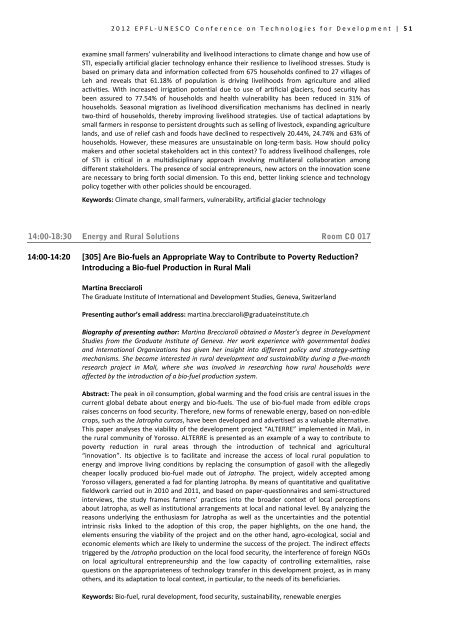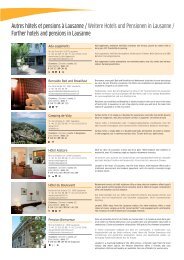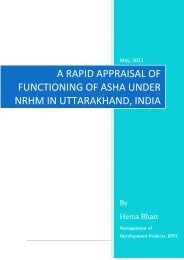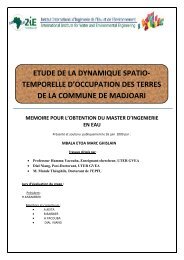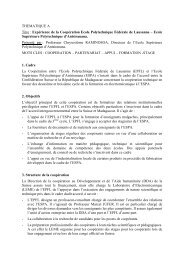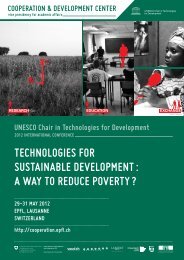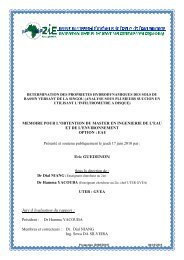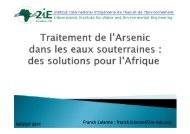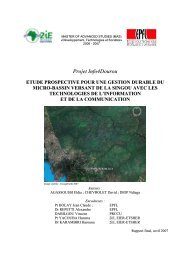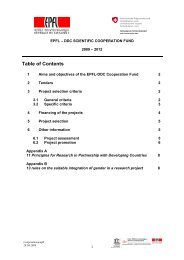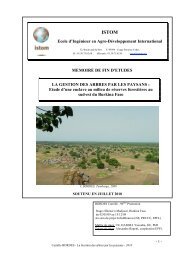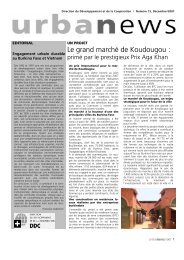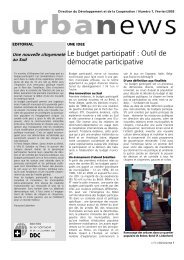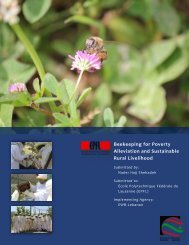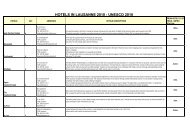TEChNOLOgIES FOR SuSTAINABLE DEVELOPMENT : A WAy TO ...
TEChNOLOgIES FOR SuSTAINABLE DEVELOPMENT : A WAy TO ...
TEChNOLOgIES FOR SuSTAINABLE DEVELOPMENT : A WAy TO ...
You also want an ePaper? Increase the reach of your titles
YUMPU automatically turns print PDFs into web optimized ePapers that Google loves.
2012 EPFL- UNESCO Conference on Technologies for Development | 51examine small farmers’ vulnerability and livelihood interactions to climate change and how use ofSTI, especially artificial glacier technology enhance their resilience to livelihood stresses. Study isbased on primary data and information collected from 675 households confined to 27 villages ofLeh and reveals that 61.18% of population is driving livelihoods from agriculture and alliedactivities. With increased irrigation potential due to use of artificial glaciers, food security hasbeen assured to 77.54% of households and health vulnerability has been reduced in 31% ofhouseholds. Seasonal migration as livelihood diversification mechanisms has declined in nearlytwo-third of households, thereby improving livelihood strategies. Use of tactical adaptations bysmall farmers in response to persistent droughts such as selling of livestock, expanding agriculturelands, and use of relief cash and foods have declined to respectively 20.44%, 24.74% and 63% ofhouseholds. However, these measures are unsustainable on long-term basis. How should policymakers and other societal stakeholders act in this context? To address livelihood challenges, roleof STI is critical in a multidisciplinary approach involving multilateral collaboration amongdifferent stakeholders. The presence of social entrepreneurs, new actors on the innovation sceneare necessary to bring forth social dimension. To this end, better linking science and technologypolicy together with other policies should be encouraged.Keywords: Climate change, small farmers, vulnerability, artificial glacier technology14:00-18:30 Energy and Rural Solutions Room CO 01714:00-14:20 [305] Are Bio-fuels an Appropriate Way to Contribute to Poverty Reduction?Introducing a Bio-fuel Production in Rural MaliMartina BrecciaroliThe Graduate Institute of International and Development Studies, Geneva, SwitzerlandPresenting author’s email address: martina.brecciaroli@graduateinstitute.chBiography of presenting author: Martina Brecciaroli obtained a Master’s degree in DevelopmentStudies from the Graduate Institute of Geneva. Her work experience with governmental bodiesand International Organizations has given her insight into different policy and strategy-settingmechanisms. She became interested in rural development and sustainability during a five-monthresearch project in Mali, where she was involved in researching how rural households wereaffected by the introduction of a bio-fuel production system.Abstract: The peak in oil consumption, global warming and the food crisis are central issues in thecurrent global debate about energy and bio-fuels. The use of bio-fuel made from edible cropsraises concerns on food security. Therefore, new forms of renewable energy, based on non-ediblecrops, such as the Jatropha curcas, have been developed and advertised as a valuable alternative.This paper analyses the viability of the development project “ALTERRE” implemented in Mali, inthe rural community of Yorosso. ALTERRE is presented as an example of a way to contribute topoverty reduction in rural areas through the introduction of technical and agricultural“innovation”. Its objective is to facilitate and increase the access of local rural population toenergy and improve living conditions by replacing the consumption of gasoil with the allegedlycheaper locally produced bio-fuel made out of Jatropha. The project, widely accepted amongYorosso villagers, generated a fad for planting Jatropha. By means of quantitative and qualitativefieldwork carried out in 2010 and 2011, and based on paper-questionnaires and semi-structuredinterviews, the study frames farmers’ practices into the broader context of local perceptionsabout Jatropha, as well as institutional arrangements at local and national level. By analyzing thereasons underlying the enthusiasm for Jatropha as well as the uncertainties and the potentialintrinsic risks linked to the adoption of this crop, the paper highlights, on the one hand, theelements ensuring the viability of the project and on the other hand, agro-ecological, social andeconomic elements which are likely to undermine the success of the project. The indirect effectstriggered by the Jatropha production on the local food security, the interference of foreign NGOson local agricultural entrepreneurship and the low capacity of controlling externalities, raisequestions on the appropriateness of technology transfer in this development project, as in manyothers, and its adaptation to local context, in particular, to the needs of its beneficiaries.Keywords: Bio-fuel, rural development, food security, sustainability, renewable energies


